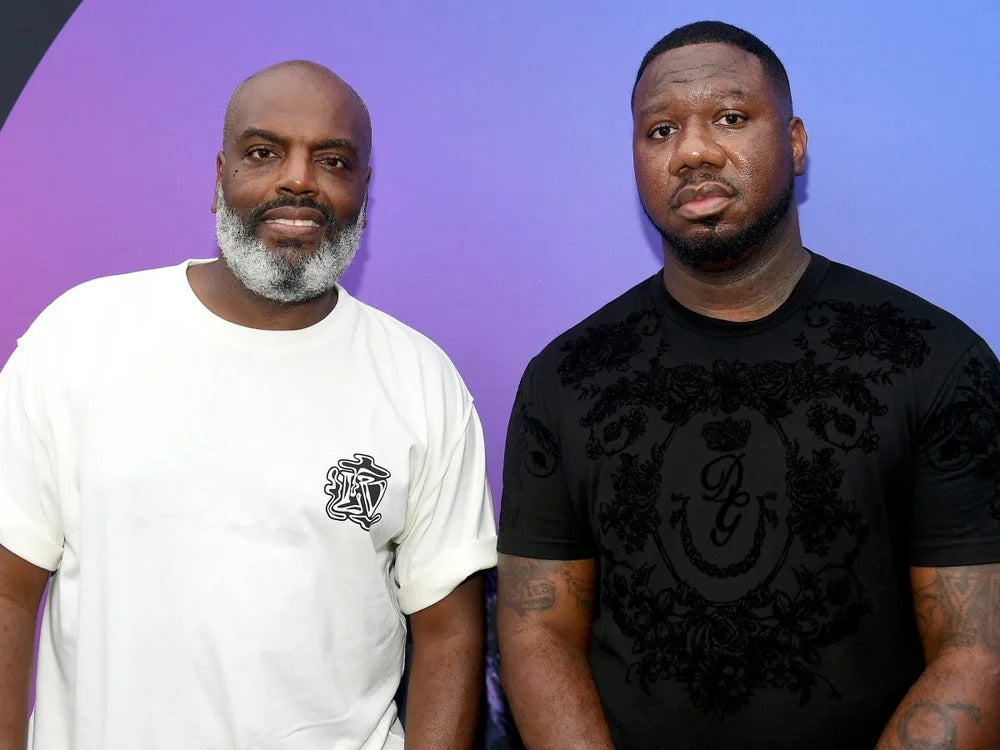
What do Metro Boomin, Bob Dylan, Future, Justin Bieber, and Whitney Houston all have in common?
Aside from incredible success in music, the common denominator is their decision to sell their song catalog.
Since the pandemic, we’ve seen a music portfolio acquisition boom in which high-profile artists, producers, and songwriters are selling their rights to tracks they have stake in.
This year alone, we’ve seen a slew of reports announcing deals being struck between musicians and purchasing entities, including a move few of us saw coming, the sell of Quality Control (QC)—the popular formerly Black-owned record label that’s largely responsible for the careers of Lil Baby, The City Girls and the Migos among other notables.
As previously reported by ESSENCE, QC’s founders Pierre Thomas (known as P) and Kevin Lee (a.k.a. Coach K), brokered a deal to sell QC to Hybe America, a subsidiary of a South Korean conglomerate headed up by music executive Scooter Braun. Although exact amounts were unconfirmed, the estimated payout is around $300 million. The move came as a shock to fans and even stoked questions about selling out.
This reignited an already fiery conversation about publishing rights, which are normally kept by publishers and songwriters, and recorded rights belong to labels and performers — but we’ve been seeing the pendulum swing another way.
“Things are definitely changing,” Sharde’ Simpson told ESSENCE. She is the co-founder of entertainment law firm Simpson & Reed and serves as the Vice President of Operations at Dream Chasers, Meek Mill’s record label with Roc Nation. If anyone would know about a seismic shift in the industry, Simpson would. Her music business inside track runs deep, as her career with Roc Nation began in 2008 as an executive assistant to Tyran “Ty Ty” Smith, one of Jay-Z’s most trusted confidantes and business partners. She then spent some years in A&R before moving full-time into law.
“I think there are a number of reasons artists are willing to sell their catalogs,” she told ESSENCE. “It’s artist-specific but the biggest reason usually is to generate large amounts of money pretty quickly.”
This cash grab makes sense, as artists typically make meager earnings from streaming and often find themselves in debt to the labels they’re signed to after they’ve fronted marketing and operational costs.
As ESSENCE previously pointed out, noticeably shorter song lengths stem from streaming platforms’ pay per play operating model, in which low streaming music layouts have caused song length to shorten so listeners are encouraged to replay the song more often, thus bumping up the amount artists earn.
As Brooklyn White wrote, a platform like Spotify pays major artists between $0.004 and $0.008 per stream, which incentivizes artists to create shorter tracks. But if artists aren’t willing to gamble on their songs going viral on TikTok, go on strenuous tours or nail down stringent brand deals, selling their catalogs are an easy pathway to financial freedom. Not to mention the tax benefits don’t hurt either.

WHAT’S DRIVING THE “CASH-OUT” ERA ASCENT?
Tax Breaks
Rolling Stone reported that catalog sell-offs provide the particularly successful with tax breaks due to a Bush administration-era law that allowed musicians use catalog sales as capital gains, rather than income (which carries a heftier tax price).
Estate Planning
Simpson also points out another practical reason fans may not think about when their faves let go of their music ownership rights: estate planning.
“A large one-time lump sum of money would help, obviously, an artist that may not be generating as much income from the music industry as they once were at some point in their career,” Simpson explained. “For instance, if maybe an artist has passed away or they’re getting older and they want to leave something on to their family, they might will it away or figure out how to incorporate the sell into their estate plans.”
Investments
“And then people self-catalog for investment opportunities,” Simpson offered. “That could work on both sides. An artist could be wanting to just have a large sum of money they know they can get upfront to so invest in maybe real estate or the stock market etc.”
Power and Control
Purchasing licensing and other rights enable entities to get royalties, lucrative brand deals, and other capital streams that would’ve otherwise gone to the artist.
As Simpson points out, these sort of deals aren’t new and one of the most notable reaches back decades centering the King of Pop.
“Michael Jackson at one point had purchased someone a few years back and that was more of an investment decision,” Simpson said. The historic deal she’s referring to is when in 1985, Jackson bought the publishing rights to the vast majority of the Beatles’ catalog for $47 million, outbidding frontman Paul McCartney himself. A decade after the initial deal, Jackson sold 50 percent of ATV to Sony for $95 million, creating the music publishing company Sony/ATV according to reports, earning him a profit of nearly $50 million. This isn’t including the money he’d earned in the years he held ownership.
Why do these $$$ deals seem so low?
Quality Control’s acquisition deal was reportedly worth an estimated $300 million. Although unconfirmed, if the real number is anywhere near the speculated figure, some would say it’s a fairly low one.
Simpson said she understands people’s confusion and will be watching the trajectory of similar deals closely.
“I personally think it’s going to be interesting to see in the future whether or not the numbers are low or high,” she said, qualifying that each deal is extremely specific to each artist. “A lot of what goes into valuations is called pipeline income. If an artist, writer, producer or label head is selling publishing catalogs, you look at the music they’ve put out in the past, and evaluate at the rough estimates of monies that are coming in. They’re generating revenue based on the percentage of ownership that they have in these compositions. And it’s kind of a similar concept if it was a master recording situation. But most of these artists that I’ve been reading about have been selling the publishing side of their catalog because they don’t own the master side.”
Are all of these sell-offs signaling an ominous shift in the music business?
Simpson says “no,” but the future is definitely going to be different.
Just like its consumers, the music business is “constantly evolving,” Simpson said. “It evolved from records, cassettes, iPods and now digital. We’re just at another stage in the game, and I think that this is just a part of that evolutionary process.”